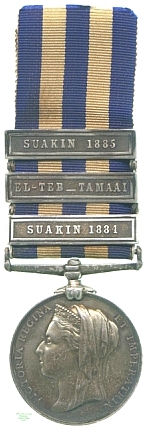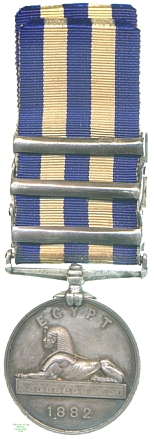
Obverse, a bust of Queen Victoria with veil

Reverse, the Sphinx on a pedestal facing left

Obverse, a bust of Queen Victoria with veil |

Reverse, the Sphinx on a pedestal facing left |
Victorian-period Egypt was technically a dependency of the Ottoman Empire, but in fact the Khedive, Tewfik Pasha, was effectively in the hands of Britain and France, for whom control of the Suez Canal was a strategic necessity. Egypt's shaky economic situation endangering this, in 1879 Britain and France took over government in an arrangement of dual control. This foreign influence was much resented in Egypt, and especially within the army. A Colonel by the name of Ahmad Urabi (Arabi Pasha) became the spearhead of the movement, which launched a coup in 1882. After some international indecision this was suppressed by British arms, and this medal awarded to those involved.
The bars of the medal however relate to a later campaign, against Sheikh Muhammad Ahmad ibn al-Sayyid 'Abd Allah and his allies, who after the proclamation of Muhammad Ahmad as Mahdi (the legendary final redeemer of Islam) in 1881 threatened to remove the Sudan, technically an Egyptian possession, entirely from the Khedive's control. Several serious defeats of Egyptian forces in 1884 led to a concerted British campaign, but despite a victory at El-Teb and another fierce battle at Tamaai, and two engagements at the Red Sea port of Suakim, control could not be recovered. The British withdrew their forces to Egypt and to Khartoum, where General Gordon defended the city whilst awaiting a relief column that, beset by Mahdist attacks, arrived too late.
This medal was awarded to Gunner T. Earle, of the 1st Scots Division, Royal Artillery, for participation in the initial 1882 campaign, but he clearly fought in the 1884-1885 campaign too, earning bars for both Suakim battles and the combined bar for the engagements of El-Teb and Tamaii. Lester Watson acquired his medal at some point before 1928.